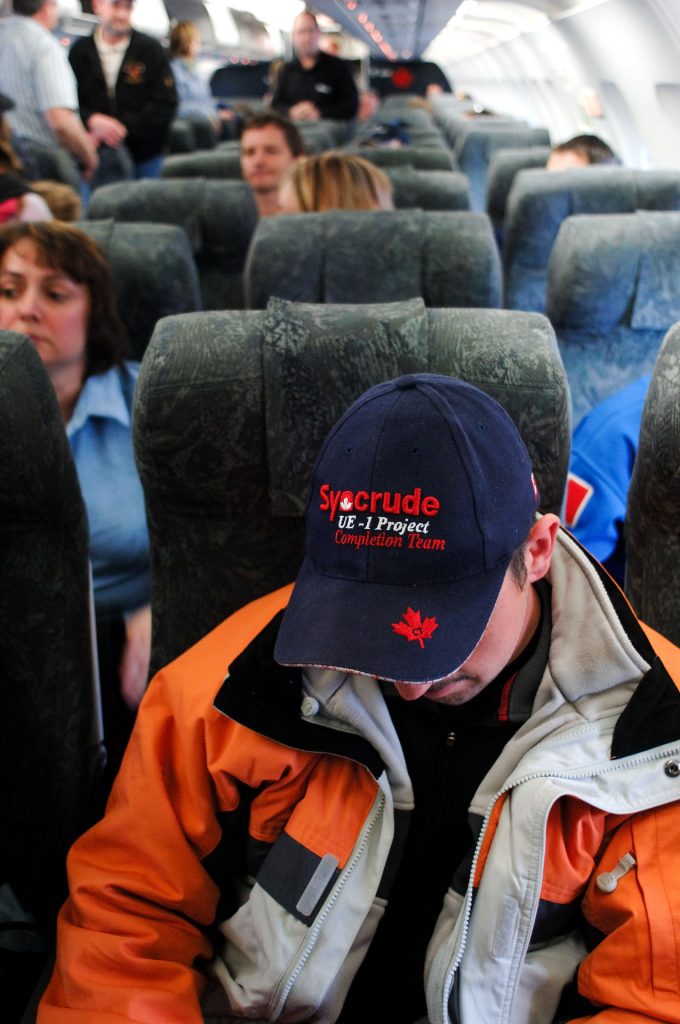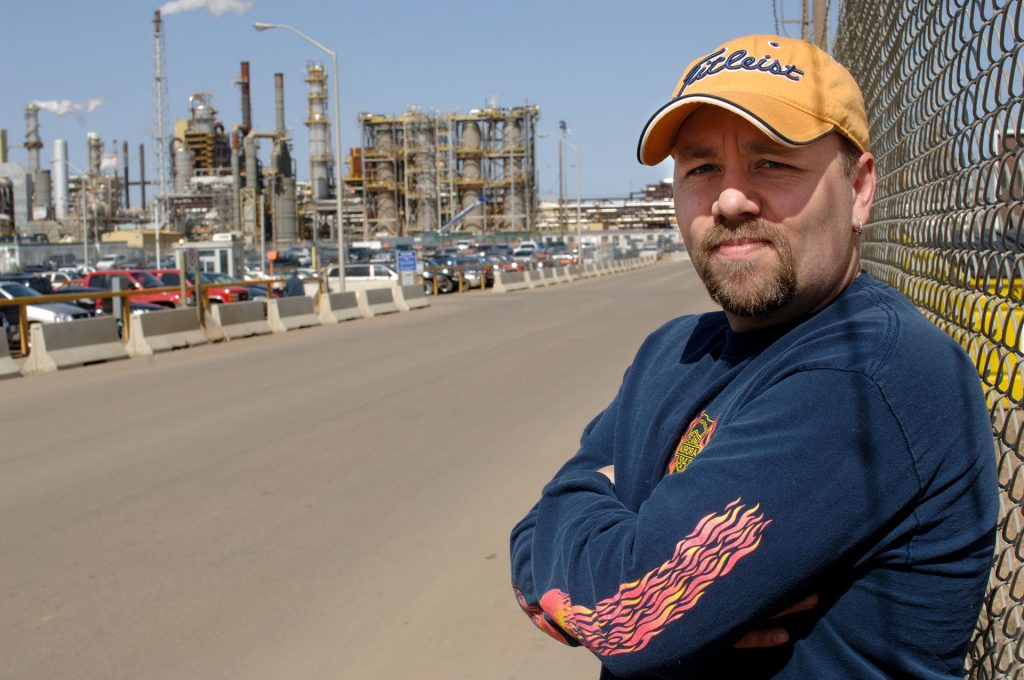Moving Labour
Making the journey west with Newfoundland’s migrant workers


Fort McMurray, AB. (2006) – Contrary to what many of my mainland colleagues thought (some of whom are influential business journalists), a plane full of Newfoundlanders heading to well paying jobs in Alberta was not going to be a “Party Plane” with happy people heading to a new, bright future. They couldn’t understand that the majority of the people on Air Canada’s new direct 7:00 AM flight to Fort McMurray were middle age men with grey hair. They were in a somber mood for having to leave their wives, children, grand children, and homes behind because there is no room in the new Newfoundland economy for them and their Old Economy resource and trades based skills. It was not a party plane but one filled with people resigned to a new life they didn’t particularly want. “Stewardess, how much was that beer again?”
Look beyond the surface and you realize you are still “on the truck” in California with modern day fruit pickers or south Asia construction workers in the Middle East, the latest migration of foreign labour in the global economy, the latest wave of Newfoundlanders fleeing the collapse of their local economy. While they may have better working conditions and more rights than foreign workers, the principle is the same ..moving humans from their homes to fill labour needs around the globe. “Your mileage may vary”
Sure, Newfoundland will lead the country in “economic growth” and Gross Domestic Product, the geeky number stuff bankers and economists use. The reality is that all that “economy” is oil revenue, most of which flows out of Newfoundland to Ottawa, Calgary and Houston right along side those who have lost their jobs in the paper mills and fish plants.
WEALTH IS IN THE AIR
You can certainly taste the money in the air on the main streets and new suburbs of Fort McMurray. In the parking lot of the Newfoundlanders Bar & Restaurant I figure there is about $2 million worth of pick-up trucks. What better place to start tracking the wandering Newfoundlander.
Inside it’s big and dark with band equipment by the dance floor and a trophy case in the corner. Just like any club or legion hall anywhere in Newfoundland but its cleaner and the bar and furniture are new …and it’s filling up fast with faces that look familiar. A table in the centre of the room with 20 middle aged women are laughing loud and ordering supper from stern young waitresses … the men huddle at the bar. I order a hot turkey sandwich. The Irish Descendants provide the soundtrack. It is a little Newfoundland, an odd mix of an Irving restaurant, George Street, and any of “lounges” you find across the island.
This is not the first wave of Newfoundlanders Fort McMurray has seen. Newfoundlanders have been coming here for twenty years. Kathy White, a waitress, who came here twenty years ago with her husband, refers to the “Newcomers” when asked about the recent influx of migrant workers from “home.”
This dividing line is evident in other conversations. The ones who have been here for awhile have taken on the demeanour of other immigrant communities when they talk about the “old country”. Sometimes its nostalgia, sometimes its disdain, but either way it’s based on a sense of having “done better” and memories of a Newfoundland that may be twenty or thirty years out of date. One is inclined to think Newfoundland has changed since then, that we are better off, and these people are wrong. But the exodus today feels far greater and somehow more profound than that of the 1960’s and 1970’s.
I join a table of four men. The youngest is 35 the oldest 55. Two have just arrived and two have worked all over the north and Alberta for years. They have something else in common besides leaving home to find work. It’s obvious that “the economy” has taken a toll on personal relationships and, by extension, the social fabric of Newfoundland.
William Hillard, a quiet, graying 40 year old ran a saw mill in the Codroy Valley employing 5 men. He left his family and business and came to Fort Mac late last year but plans to go back, at least for a short period. “I promised the guys I would make a few bucks and come back to start up the saw mill again for the summer …for them …but I’ll be back here after that.” he said.
With the personal talk out of the way, the conversation turns to “the toys”, pick up trucks, motorcycles, ATV’s and the good natured ribbing that goes with it. The melancholy aside, everyone agrees when Hillard says “we are all here just to make some money.” Dropping another round on the table, the lean, pretty but hard-as-nails waitress adds, “This place is just about work …work, work, work.”
She is right. Fort McMurray has the air of a giant work camp.
SUNDAY MORNING COMING DOWN.

My God! Is that the Ennis Sisters ringing in my ears as I stumble into the all night café? Yup, the radio station has a Sunday morning Newfoundland music show. The middle-aged waitress in pink hot pants says “Coffee my love?” …she’s definitely from home. Sure enough, Diane is from Conception Bay and came here 15 years ago. She married a local man but still hangs with the Newfoundland community. She says she’s heard that over half the population of Fort McMurray are Newfoundlanders. She meets a lot of the newcomers (there’s that word again) and says, “One of the problems is that many may not really be prepared for the expensive housing …when you can find it, and the cost of everything from day one. People shouldn’t come here without money in their pocket …or, at least, friends or family to help you get started.”
Across the parking lot and down an ally, two women are having a smoke outside the Salvation Army shelter. They run the place. Both are from Newfoundland. The older woman, the manager, came here 12 years ago. The “newcomer” is Gwen Anne Wells. She and her husband came here five months ago when they lost their jobs at the fish plant in Comfort Cove. They will soon be joined by their daughter, son-in-law and two grand-daughters. Gwen will then return to Newfoundland to “close up the house.” Her entire family will then be in Fort McMurray …and they plan to stay. When I ask about raising a family here she says, “It’s not a great place for kids. The drugs and lifestyle are rough …”, her voice trails off but the she adds, “. . .the schools seem really good and my daughter will be staying home with the kids.” She sighs, “What are you going do? You gotta live.”
TRYING TO MAKE A LIFE
I watch the Sunday afternoon parade of expensive sports cars, SUV’s (did I mention the pink  Hummer?) and motorcycles cruise the main drag. The Harley’s have gathered at the Tim Horton’s.
Hummer?) and motorcycles cruise the main drag. The Harley’s have gathered at the Tim Horton’s.
Steve Russell and Mark Roberts are also trying to make a life here with little talk of going back to Newfoundland. Roberts, who operates a “Heavy Hauler” at the Syncrude site, is single and enjoys the work, the pay and the lifestyle it brings. Originally from Rocky Harbour, he says, “I’ve been in Alberta at various jobs for nine years. If I was home I’d be unemployed. There is no work for what I do there.”
Russell has been working for six years to build a life in Fort McMurray. His sister, Michelle, who works in a machine shop, says he struggled for years before he finally landed his present job at Syncrude. Now he is building a new house for his young family in a pleasant suburb on the hill overlooking Fort McMurray. “Sure it’s expensive, but we’re making the money so why not. I couldn’t leave my wife and kids in Newfoundland and commute,” says Russell. “Sure it’s a bit of a rough place but there are jobs, the schools are great, there is getting to be more for kids and there are good services, so….”
He’s staying.
NECESSARY LABOUR
On May 1st, International Labour Day, thousands of Mexican workers in the USA put down their tools to protest a new US bill to restrict migrant workers, both legal and illegal, in the United States. A sign at one protest in Los Angeles read, “Who’s going make your burritos now?”
What would happen if all the Newfoundlanders in Fort McMurray laid down their tools?
Locals estimate that 50%-60% of the population is from Newfoundland. Would the flow of oil from the tar sands slow to a trickle? Hardly, they would just ship in more foreign workers to do the jobs. …like they are talking about now on the dusty streets of Fort McMurray. Last month there was talk of bringing plane loads of Chinese workers to Alberta. Maybe Russians will be next. Africans are already driving the cabs. People from the Middle East run the fast food joints. I guess there are just not enough Newfoundlanders to go around.
For more photos from Fort McMurray see the photo gallery for this story.
Also see the Fort McMurray Portraits section.
For more stories about workers and life in Fort McMurray visit the Alberta Stories section of the On The Move Partnership.
A version of this story originally appeared in The Current in 2007 © 2021 Greg Locke
Photos originally appeared in the Financial Post Magazine in 2006 © 2021 Greg Locke

